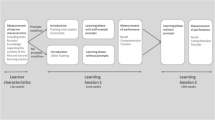Abstract
Research has shown that learners learn best when they learn actively. In collaborative learning, students take charge of learning and work with others to achieve a common goal. It helps them experience seeking and synthesizing knowledge effectively by forming and planning their research and study strategies to reach their goals. Along with collaborative learning, a growth mindset helps them to believe that their effort and hard work can help them to succeed. To help students learn and adopt a growth mindset, we propose an online learning system called “iQUIZ!”, that uses persuasive strategies (praise, simulation, self-monitoring, similarity, suggestion, and reminder) to give students feedback to foster a growth mindset and motivate the students to practice active participation in a collaborative learning environment.
Access this chapter
Tax calculation will be finalised at checkout
Purchases are for personal use only
Similar content being viewed by others
References
Laal, M., Laal, M.: Collaborative learning: what is it? Procedia – Soc. Behav. Sci. 31, 491–495 (2012). https://doi.org/10.1016/j.sbspro.2011.12.092
Nuntasri, W., Chaichomchuen, S.: Development of positive thinking repository by improving growth mindset through project-based learning in a digital environment. In: ACM International Conference Proceeding Series, pp. 236–241. Association for Computing Machinery (2020). https://doi.org/10.1145/3395245.3396444
Dweck, C.S.: Self-Theories. Psychology Press (2013). https://doi.org/10.4324/9781315783048
Stohlmann, M.: Growth mindset in K-8 STEM education: a review of the literature since 2007. J. Pedagogical Res. 6(2), 149–163 (2022). https://doi.org/10.33902/JPR.202213029
Keating, L.A., Heslin, P.A.: The potential role of mindsets in unleashing employee engagement. Hum. Resour. Manag. Rev. 25(4), 329–341 (2015). https://doi.org/10.1016/j.hrmr.2015.01.008
Burnette, J.L., et al.: A growth mindset intervention: enhancing students’ entrepreneurial self-efficacy and career development. Entrepreneurship Theor. Pract. 44(5), 878–908 (2019). https://doi.org/10.1177/1042258719864293
O’Rourke, E., Haimovitz, K., Ballweber, C., Dweck, C.S., Popovíc, Z.: Brain points: A growth mindset incentive structure boosts persistence in an educational game. In: Conference on Human Factors in Computing Systems – Proceedings, pp. 3339–3348. Association for Computing Machinery (2014). https://doi.org/10.1145/2556288.2557157
Orji, F., Vassileva, J.: Personalized Persuasion for Promoting Students’ Engagement and Learning E-Commerce Trust View project Persuasive Technology View project. https://www.researchgate.net/publication/330658206 (2018)
Oinas-Kukkonen, H., Harjumaa, M.: Persuasive systems design: key issues, process model, and system features. Commun. Assoc. Inf. Syst. 24(1), 485–500 (2009). https://doi.org/10.17705/1cais.02428
Oyebode, O., Ndulue, C., Mulchandani, D.: Tailoring persuasive and behaviour change systems based on stages of change and motivation. In: Conference on Human Factors in Computing Systems – Proceedings, Association for Computing Machinery (2021). https://doi.org/10.1145/3411764.3445619
Kizilcec, R.F., Goldfarb, D.: Growth mindset predicts student achievement and behavior in mobile learning. In: Proceedings of the 6th 2019 ACM Conference on Learning at Scale, L@S 2019. Association for Computing Machinery, Inc. (2019). https://doi.org/10.1145/3330430.3333632
Limeri, L.B., et al.: Growing a growth mindset: characterizing how and why undergraduate students’ mindsets change. Int. J. STEM Educ. 7(1), 1–19 (2020). https://doi.org/10.1186/s40594-020-00227-2
Rhew, E., Piro, J.S., Goolkasian, P., Cosentino, P.: The effects of a growth mindset on self-efficacy and motivation. Cogent Educ. 5(1), 1492337 (2018). https://doi.org/10.1080/2331186X.2018.1492337
Donohoe, C., Topping, K., Hannah, E.: The impact of an online intervention (Brainology) on the mindset and resiliency of secondary school pupils: a preliminary mixed methods study. Educ. Psychol. (Lond) 32(5), 641–655 (2012). https://doi.org/10.1080/01443410.2012.675646
Boaler, J., Bryant, C., Klein, J.: Promoting a Growth Mindset Through Personalized Mindset Coaching A Promising Experiment with Motion Math (2017). https://www.youcubed.org/wp-content/uploads/2017/03/Motion-Math-final.pdf. Accessed 18 Feb 2023
Sato, M.: Mindsets and language-related problem-solving behaviors during interaction in the classroom. Innov. Lang. Learn. Teach. 16(3), 265–276 (2022). https://doi.org/10.1080/17501229.2021.1895803
Sheffler, P.C., Cheung, C.S.: The role of peer mindsets in students’ learning: an experimental study. Br. J. Educ. Psychol. 90(S1), 17–34 (2020). https://doi.org/10.1111/bjep.12299
Widyasari, Y.D.L., Nugroho, L.E., Permanasari, A.E.: Persuasive technology for enhanced learning behavior in higher education. Int. J. Educ. Technol. High. Educ. 16(1), 1–16 (2019). https://doi.org/10.1186/s41239-019-0142-5
Mintz, J., Aagaard, M.: The application of persuasive technology to educational settings. Educ. Tech. Res. Dev. 60(3), 483–499 (2012). https://doi.org/10.1007/s11423-012-9232-y
Lucero, A., Zuloaga, R., Mota, S., Muñoz, F.: Persuasive technologies in education: improving motivation to read and write for children. In: IJsselsteijn, W.A., de Kort, Y.A.W., Midden, C., Eggen, B., van den Hoven, E. (eds.) PERSUASIVE 2006. LNCS, vol. 3962, pp. 142–153. Springer, Heidelberg (2006). https://doi.org/10.1007/11755494_20
Kiron, N., Adaji, I., Long, J., Vassileva, J.: Tower of questions (TOQ): A serious game for peer learning. In: Liapis, A., Yannakakis, G. N., Gentile, M., Ninaus, M. (eds.) GALA 2019. LNCS, vol. 11899, pp. 276–286. Springer, Cham (2019). https://doi.org/10.1007/978-3-030-34350-7_27/TABLES/4
Author information
Authors and Affiliations
Corresponding authors
Editor information
Editors and Affiliations
Rights and permissions
Copyright information
© 2023 The Author(s), under exclusive license to Springer Nature Switzerland AG
About this paper
Cite this paper
Omar, M.T., Kiron, N., Vassileva, J. (2023). iQUIZ!: A Collaborative Online Learning System that Promotes Growth Mindset Using Persuasive Feedback. In: Frasson, C., Mylonas, P., Troussas, C. (eds) Augmented Intelligence and Intelligent Tutoring Systems. ITS 2023. Lecture Notes in Computer Science, vol 13891. Springer, Cham. https://doi.org/10.1007/978-3-031-32883-1_27
Download citation
DOI: https://doi.org/10.1007/978-3-031-32883-1_27
Published:
Publisher Name: Springer, Cham
Print ISBN: 978-3-031-32882-4
Online ISBN: 978-3-031-32883-1
eBook Packages: Computer ScienceComputer Science (R0)





